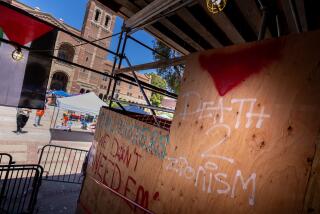Jewish Academic a Pariah in Cairo
CAIRO — The director of the Israeli cultural center in Egypt’s capital flips through a thin Arabic-language pamphlet. He stops at a picture of himself with the caption, “Professor Sasson Somekh, the famous Jewish spy.”
Life in the Arab world’s largest city has been frustrating for Somekh, and it is only becoming more so as Egypt’s cold peace with Israel turns frigid.
Egypt’s press has stepped up attacks on Somekh and the center. Egyptian academics who once considered visiting Israel have halted contacts. Even Somekh’s American-born wife, Terrie, finds doors closing--a job offer was withdrawn after a potential employer read a scathing article on the center.
“We are pariahs here,” said Somekh, a graying, soft-spoken professor of Arabic literature from Tel Aviv University who is one of the world’s top experts on Naguib Mahfouz, the Egyptian author who won the 1988 Nobel Prize in literature.
Somekh said he plans to leave Egypt as soon as his term at the center ends in October.
“We are being treated as though we are trying to rob Egypt of something, not as scholars,” he said, sitting in his small office. On the wall is a painting of Saadia Gaon, a Jewish scholar born more than 1,000 years ago in Fayoum, a town south of Cairo.
The Israeli Academic Center--the facility’s official name--was set up in 1982 by Israel’s six universities to boost cultural ties with Egypt after the signing of the Israel-Egypt peace accord. But it was never well received because many Egyptians remain suspicious of their former enemy.
As the Middle East peace process stalled, that wariness has sometimes turned to hostility, especially in the news media.
“Appalling Israeli cultural scheme,” the English-language Egyptian Gazette said in a headline for a story that accused the center of trying to “brainwash students with Israeli ideas and thaw the ice between Egypt and Israel.”
Somekh, 63, dismisses as ridiculous newspaper reports that the center is spying on Egypt.
He agreed to head the center in 1995, two years after Israel signed its peace agreement with the Palestinians. He hoped for warmer relations with Egypt and envisioned the center growing from a library putting on lectures on Israeli history and culture into a meeting place that would expand ties between scholars.
“I had a feeling things were changing,” said Somekh, who was born in Baghdad but fled to the newly established state of Israel in 1951 along with many in Iraq’s Jewish community.
Somekh’s optimism began to fade after an April 1996 Israeli artillery blitz in southern Lebanon killed almost 100 Arab civilians taking shelter in a United Nations peacekeeping base. Israel says the shelling was a mistake.
Somekh said he got calls in the middle of the night from Egyptian friends who told him: “Sasson, how could you do this? I am ashamed to be pro-peace.”
Visitors to the center slowed from the usual 20 or so a day to a trickle.
“It is not good to go if there are problems,” said a professor of Hebrew who attends lectures at the center and has visited Israel repeatedly. “If I go there, it will seem as though I agree with what the Israeli government is doing.”
He refused to give his name for fear his colleagues would shun him if newspapers published that he had visited Israel.
The tense situation deteriorated further after Israelis elected Benjamin Netanyahu’s hard-line government a year ago.
“When I tell people I am Israeli, the typical response is, ‘Why did you elect this awful prime minister?’ ” said Somekh, a leftist who opposes Netanyahu’s policies. “I hear this every day.”
The center is housed on the third floor of a small building along the Nile that would be unremarkable except for the police officers standing in front with assault rifles.
“I don’t feel threatened, but I am careful,” Somekh said.
At a recent lecture at the center, about a dozen Egyptians--students and professors of Hebrew--chatted in Hebrew with a few Israelis.
Ashraf Mohammed, a recent graduate of Ain Shams University, said he visits the center despite being warned by family and friends about having contacts with Israelis. “The center does an important job of strengthening students’ knowledge of Hebrew,” he said.
In his office, Somekh showed a visitor his collection of pamphlets on the center, including “The Spy’s Nest in Dear Egypt: The Secret Files of the Israeli Academic Center.” The pamphlet includes a picture of Somekh and identifies him as a Jewish spy.
But Somekh’s dour look quickly turned to a grin when asked if he would work at the center again if relations between Egypt and Israel improved dramatically.
“Absolutely,” he said without hesitation. “I would jump at it.”
More to Read
Sign up for Essential California
The most important California stories and recommendations in your inbox every morning.
You may occasionally receive promotional content from the Los Angeles Times.










